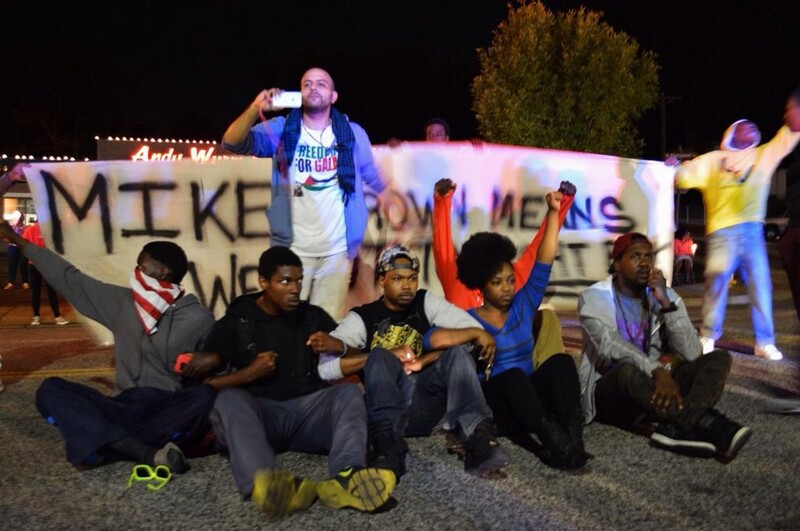Rights and Accountability 15 October 2014

Bassem Masri livestreaming with his camera phone at a protest against the police killing of Michael Brown.
A Palestinian-American activist says police in the city of St. Louis, Missouri, put pressure on him to inform on others taking part in protests against violence by that force earlier this week.
Bassem Masri, a 27-year-old self-described “pissed off citizen” from St. Louis, was arrested on Monday with around a dozen other demonstrators, including the hip-hop artist Tef Poe, while protesting at an area Walmart.
It was the third Walmart store that protesters shut down that evening in a series of actions demanding justice for Black lives cut short by police violence.
Walmart was targeted to bring attention to the police killing of John Crawford III, a 22-year-old Black man shot dead in August by a white police officer in an Ohio Walmart while talking on his cell phone and holding a toy gun. In September a grand jury decided against indicting the officers involved.
Every protester arrested at Walmart was released a few hours later, except for Masri, who was held until Tuesday night and charged with third degree assault for allegedly spitting at an officer at a protest last week. Masri has denied the charge.
“Extortion”
Masri told The Electronic Intifada that during his jail stay, St. Louis City police pressured the Palestinian-American to become a collaborator against his fellow protesters in exchange for leniency.
After being held overnight at the Richmond Heights police station, police transferred Masri to the St. Louis Justice Center on Tuesday morning. It was there, he says, that they tried to recruit him as a collaborator.
According to Masri, he was taken into an interrogation room and told to give an official statement about spitting at the officer.
“I just remained silent,” he recounted. “Then they said that there was a video of me doing it, so I asked to see my lawyer. But they didn’t even let me contact my lawyer. So I said, ‘What are y’all really bringing me in here for? You got me here for a reason. So come out with it.’”
It was then that the officers told Masri that the third degree assault charge would be taken under advisement, or put on hold, in exchange for information about protesters.
“They wanted me to put names to faces on protesters and to let them know where we be going,” recalled Masri. “It’s like extortion. I have to snitch on my friends. If I don’t snitch on my friends, they’ll re-arrest me on the [third degree assault] charge.”
Masri refused their offer and demanded he be taken back to his cell.
As this was taking place, the officers “tried to get me lost in the justice system” because “they didn’t put a wristband on me,” Masri said.
“The wristband identifies you in jail,” explained Masri. “If you’re in the county or city jails, they have to put a wristband on you because there’s so many prisoners. Otherwise they won’t know who you are. When it comes time for you to get released, they ain’t gonna release you unless you have a wrist band.”
Had it not been for a sympathetic Black corrections officer who noticed Masri was missing a wristband and got him one, Masri might not have been released, he said.
Prior to his release around 9pm Tuesday night, Masri says, officers again tried to recruit him as a collaborator, offering to provide him with a weekly paycheck for his services.
When Masri again refused, they threatened to raise his bond so high he would be stuck in jail for months. Still, he refused and suggested that if that was their intention, they should go ahead and process him. Shortly thereafter, he was released.
Masri learned later that the officers were bluffing with empty threats given that his bond had already been posted by Missourians Organizing for Reform and Empowerment (MORE), a social justice organization that has been providing jail support to protesters arrested in St. Louis.
Spitting allegation
The alleged spitting incident took place on Wednesday, 8 October, the night Vonderrit Myers, 18, was gunned down by a white off-duty St. Louis City police officer in the Shaw neighborhood. Police claimed that Myers was armed and fired first, prompting the officer to fire seventeen bullets in return, killing him.
Myers’ friends and family have vehemently denied the police narrative, insisting the teen was armed with nothing more than a sandwich.
Masri has been livestreaming protests across St. Louis since the 9 August execution-style killing of Michael Brown, a Black teenager, at the hands of Darren Wilson, a white police officer, in the St. Louis County municipality of Ferguson.
“I use the livestream to protect us,” explained Masri, especially in light of overwhelming police force directed at St. Louis protesters, who have been tear gassed, pepper sprayed and beaten with batons by seemingly endless lines of riot police.
Though he often curses and levels vulgar insults at police officers during protests, Masri said he never participates in the vandalism that police behavior sometimes provokes. Such vandalism, he argued, is nothing compared to the police violence directed at protesters and the Black community more generally.
“[Police and their supporters] get mad because I curse. This is St. Louis. We curse. When I’m mad this is what I do,” he told me.
Masri livestreamed the protest that erupted in the immediate aftermath of Myers’ death. That night, protesters tore through yellow police tape and advanced on the twenty or so officers in the neighborhood, taunting them until the officers withdrew.
One of Masri’s many trolls posted a clip from his livestream that night. Masri said that the spitting charge stemmed from that clip.
In the video, Masri is heard cursing at the officers, who are seen backing out of the neighborhood.
Around the two-minute mark, Masri is heard saying “tfooh,” an Arabic expression of disgust that mimics a spitting sound without actually spitting.
“I said ‘tfooh,’ that’s it. The officer didn’t even react,” argues Masri.
He explained that “people were bashing police car windows” but “they weren’t hurting nobody and I wasn’t involved in none of it. I was just livestreaming.”
“The police were flashing their lights in my eyes, so I put the camera in their eyes,” said Masri.
“Straight out the West Bank”
The next night, police came out in massive force against a few dozen protesters marching for justice for Vonderrit Myers. This writer watched first-hand as squads of riot police indiscriminately showered nonviolent protesters with mace (hand-held aerosols of tear gas) and slammed people with riot shields, some of which was caught on video.
Speaking of the police response that night, Masri said, “It looked straight out the West Bank.”
“The only thing that was missing was the ‘shoot to cripple,’” he said, referring to the way Israeli soldiers fire live bullets at the legs of West Bank protesters, often leaving them with permanent disabilities in an effort to deter another intifada, or uprising.
“That’s probably the next step [in St. Louis],” Masri added, only half in jest given revelations that at least two St. Louis police departments have received training from the Israeli “security” apparatus.






Comments
Masri's articel
Permalink Barbara Lyons replied on
I am in despair about what is going on. I am a senior citizen who is so proud of the young people who are putting their futures and their lives in the line. I have been out in the streets for many varied protests. I hope when push comes to shove I will be brave enough to "stand my ground."
police
Permalink mark haywood replied on
Police everywhere are adopting a Gestapo attitude because
They know they are immune to punishment for their criminal
Actions